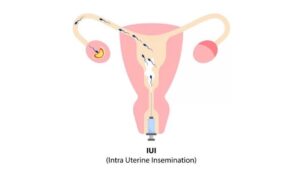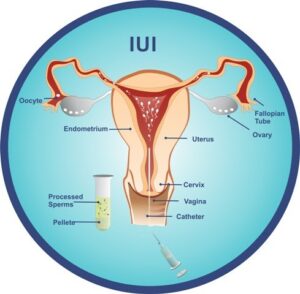Last updated on September 26th, 2024 at 11:15 am
IUI treatment (Intrauterine Insemination treatment) is a fertility procedure in which specially prepared sperm is directly placed into a woman’s uterus during her fertile period. This method is employed to enhance the chances of fertilization and pregnancy, making it a common choice for couples experiencing infertility, especially in cases of mild fertility issues, male infertility, or unexplained infertility.
IUI treatment, often referred to as artificial insemination, is a fertility treatment that involves placing sperm directly into a woman’s uterus during her fertile window. This process aims to increase the chances of fertilization by bringing sperm closer to the egg. It offers a less invasive and more cost-effective option compared to more complex treatments like IVF (In Vitro Fertilization).
IUI Treatment
IUI treatment is a relatively straightforward procedure that can be performed in a doctor’s office or fertility clinic. Here’s a step-by-step overview of what to expect:
- Ovulation Monitoring: Before beginning the IUI treatment, your doctor will closely monitor your menstrual cycle to pinpoint the most fertile days. This often involves tracking hormone levels and conducting ultrasounds to determine when you are about to ovulate.
- Sperm Preparation: On the day of the IUI procedure, the male partner will provide a semen sample. This sample is then processed in a lab to separate healthy sperm from the rest. The concentrated sperm sample is used for insemination.
Read: What are Generic Medicines?
- Insemination: Using a thin, flexible catheter, the doctor will insert the prepared sperm directly into the woman’s uterus. This process is painless and usually takes only a few minutes.
- Rest and Observation: After the procedure, you will be advised to rest for a short period. There are usually no restrictions on normal daily activities following IUI.
- Pregnancy Test: About two weeks after the procedure, a pregnancy test will be performed to determine whether the IUI treatment was successful.

IUI Treatment Medicine: Medications to Enhance Success
IUI treatment often involves the use of medications to enhance the chances of success. The choice of medication may vary depending on the specific circumstances of the couple. Here are some commonly prescribed medications associated with IUI treatment:
- Ovulation-Stimulating Medications: For women with irregular or infrequent ovulation, medications such as Clomiphene citrate or Letrozole may be prescribed to stimulate the ovaries and induce the release of eggs.
- Follicle-Stimulating Hormone (FSH): In some cases, FSH injections may be administered to encourage the development of multiple follicles, increasing the chances of fertilization.
- Human Chorionic Gonadotropin (hCG): This hormone is often used to trigger ovulation, ensuring that the eggs are released at the optimal time for IUI.
- Progesterone: After the IUI procedure, progesterone supplements may be recommended to support the uterine lining, making it more receptive to implantation.
> Consult a doctor and Order Medicine Online
It’s essential to note that the choice and combination of medications will be tailored to each individual’s unique circumstances. Your fertility specialist will determine the most suitable approach based on your medical history and fertility evaluation.

Effectiveness of IUI Treatment
The effectiveness of IUI treatment can vary depending on several factors, including the cause of infertility, the woman’s age, and the quality of the sperm. However, on average, the success rate of IUI treatment falls in the range of 10% to 20% per cycle. This means that, while IUI can be highly successful for some couples, it may require multiple cycles to achieve a pregnancy.
IUI is often recommended as a first-line treatment for couples with specific infertility issues, especially when the cause is known to be related to sperm quality or mild ovulatory problems. However, for couples facing more complex fertility challenges, such as severe male infertility or tubal factor infertility, other assisted reproductive technologies like IVF may be more suitable.
Conclusion:
IUI treatment, along with the associated medications (commonly referred to as “IUI treatment medicine”), offers a promising path to parenthood for many couples struggling with infertility. Its relatively non-invasive nature, coupled with reasonable success rates, makes it an attractive option.
Remember that each individual’s fertility journey is unique, and what works for one may not work for another. Stay informed, seek support, and most importantly, never lose sight of your dream of starting a family. With the advancements in fertility treatments, there is always hope on the horizon, and IUI treatment is undoubtedly one of the stars guiding the way.
Advantages of Generic Medicines
Generic medicines offer several advantages, including cost-effectiveness, as they are typically more affordable than brand-name counterparts. They undergo rigorous testing to ensure safety and efficacy, providing reliable alternatives. Moreover, their wide availability makes them accessible to a broader population.
Generic drugs contribute to reducing overall healthcare costs, allowing patients to receive quality treatment without financial burden, and often have the same therapeutic benefits as brand-name medications.
FAQs on IUI Treatment
Q1. What is IUI treatment?
IUI treatment, or Intrauterine Insemination, is a fertility procedure where carefully prepared sperm is placed directly into the uterus to enhance the chances of pregnancy. It is often used to address male infertility, unexplained fertility issues, or as a less invasive fertility treatment option.
Q2. What is the Success Rate of IUI Treatment?
The success rate of IUI treatment can vary depending on several factors, including the cause of infertility, the woman’s age, and the quality of sperm. On average, it falls in the range of 10% to 20% per cycle. Success rates may improve with multiple cycles.
Q3. Is IUI Painful or Invasive?
No, IUI is generally not painful or invasive. The procedure is relatively simple and painless, similar to a Pap smear. It is typically performed in a doctor’s office or fertility clinic, and patients can resume their daily activities immediately afterwards.
Q4. How Many IUI Cycles are Recommended?
The number of recommended IUI cycles varies from patient to patient. Some may achieve pregnancy in the first cycle, while others may require multiple attempts. Fertility specialists usually assess the individual’s response to treatment and adjust the plan accordingly, typically considering up to six cycles before exploring other options.
Related Links: